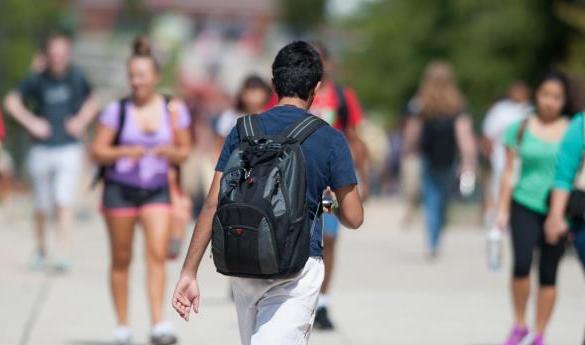OPINION: Online classes fail to provide essential aspects of the college learning experience
My first week of college as a freshman was the most exciting and anxiety-filled week of my life. As a freshman, Mason has been my home away from home--a land of green and yellow growth and development. What I have learned thus far has not only been a function of the essential in-classroom experience, but also comes as a result of spending time outside of the brick and mortar walls. American sociologist and Princeton professor Michell Duneier’s article “Teaching the World from Central New Jersey” advocates his opinion on the importance of “Massive Open Online Courses”, commonly referred to as “MOOCS.” Duneier, in his article, argues that massive online open courses are the new trend in higher education. Duneier’s argument expresses some positive aspects of MOOCS, such as the ability to arrange live webinars with a selected group of diverse individuals from around the world, thus enhancing the subject content with each student’s culture, which drives the sociological discussion. A drawback, however, is that when Duneier hosts these live webinars, he is only able to select a small group ranging from six to eight students per discussion.This number constrains and limits the thousands of additional students taking the same online course.
If MOOCS are so revolutionary, why do so many students still prefer the in-class experience? I would argue that the students in question recognize the benefit of learning from a professor face to face. Although online learning may have advantages, I’ve found that I have gained invaluable experience as a result of taking traditional classes and living on campus. The in-classroom experience in college is extremely valuable as there is a beauty behind engaging with professors during class discussions and building face to face relationships with fellow peers. As a freshman, I am taking general education courses and a few courses within my major where I am able to leverage the in-class experience by taking notes on the subject, participating in class discussion, posing questions to my professors, taking exams and finals and learning from my peers to advance my grade. My professors and I are able to culminate a relationship in the classroom that helps me develop a certain level of comfort within the classroom; thus, this relationship impacts my ability to learn new material. In many cases, the relationship between my professors and I can be as simple as the professors’ abilities to read my body language, thereby being provided with a non-verbal cue acknowledging that I understand the subject material. I would argue that, in a college atmosphere, the engagement between a professor and student is integral to the student’s aptitude to learn the course material. The essence of a student engaging with his or her professor during in-classroom discussion does not just affect their ability to learn, but their ability to earn a good grade in the course.
At George Mason University as well as other diverse college campuses across the world, higher-learning institutions pride themselves on the opportunity to broaden their perspectives with help from a multitude of cultures and backgrounds. The dynamics of the classroom setting shifts with each student’s personal influence from his or her own heritage, culture and background. The chance to have student-to-student communication during a lesson presents an opportunity for material to be learned from the perspective of each and every student sitting in my class. One student in the classroom is able to add their own insight to the specified topic. And with the addition of benefitting from interactions inside a classroom, working with a varied group of peers, a student can only gain an even broader, better rounded education as well as valuable friendships from the in-classroom approach.
George Mason University provides students with advice and guidance for their major, serves as a point of leverage for internships and job opportunities, develops a positive young adult mentality and introduces students to lifelong friends. These are all organic elements crucial to the college culture and add a personalized and reassuring aspect to a professor’s otherwise impersonal lesson.
It is easy to become lost in a new-wave trend when it comes to education, but there are no substitutes for ”old school” education—so why try fixing things that are not broken? The tradition of professors teaching students in the classroom in higher academia is invaluable for there is a priceless opportunity for learning found behind engaging with professors during class discussion and building relationships with fellow peers.
If it is not broken, why fix it?
Opinions expressed in this column are solely the beliefs of the writer.
Would you like to have your opinion considered for publication? If so, send an email to opinion@connect2mason.com with the subject line "opinion writer position."

